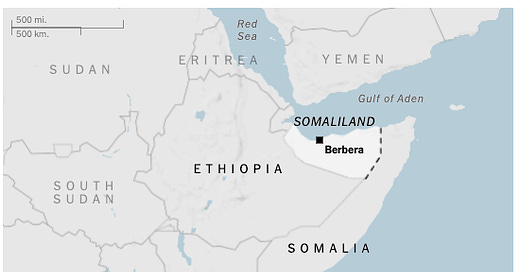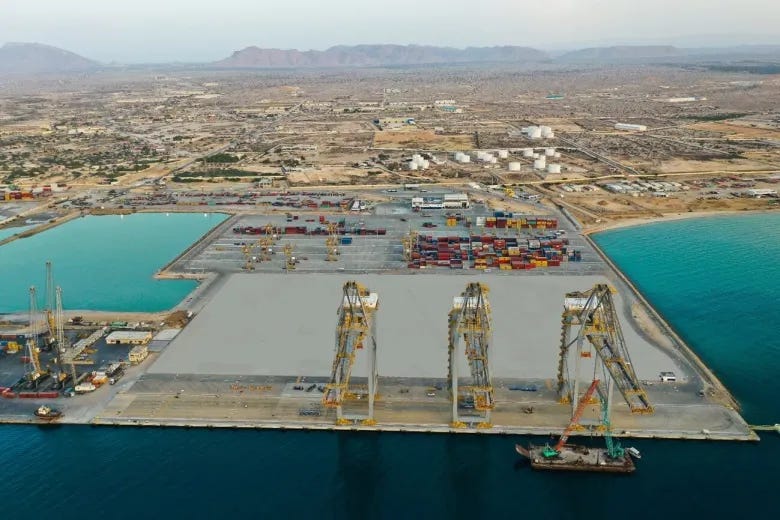I have previously posted about the issues confronting Somalia and its control of the country (LINK Here). The region has a new political crisis driven by the economic needs of Ethiopia and Somaliland, and the threats by Somalia.
What is Somaliland?
Somaliland is one of the three districts in Somalia, where the central government controls very little of the physical land and none in the Somaliland area. Somaliland was incorporated into Somalia in 1960 through a referendum that few actual Somaliland residents voted in. During the worst of the Somalia civil wars in 1990, Somaliland declared its independence and has been acting as an independent nation since.
The semi-state has entered into many economic agreements with international businesses and other nations despite lacking government recognition. Most governments have opposed international recognition as a bad precedent. The latest and most controversial action by Somaliland is to lease a portion of the port of Berbera and the adjoining coastline to Ethiopia.
What is the issue over the Port of Berbera
When a nation’s interest bump up against international politics, real politic has a way of changing motivations. The participating countries, Ethiopia and Somaliland, will break the status quo because the action is beneficial enough. This is what has happened with Ethiopia relative to the international community. The Berbera crisis concerns the port's status and Ethiopia’s access to it via an unrecognized state.
Missing Port
Ethiopia has been landlocked since the independence of Eritrea, whose independence was gained via civil war. As a result, Ethiopia is the largest landlocked country in the world in terms of population.
Ethiopia’s current “port” is in the independent nation of Djibouti. Djibouti has monetized its unique position at the mouth of the Red Sea and has become a very expensive harbor. Ethiopia currently pays approximately US $ 1.5 Billion a year in a port crowded with foreign military bases. And this access is critical, more than 95% of Ethiopia’s trade goes through Djibouti.
One alternative could be using a port in Eritrea. However, Ethiopia cannot count on continued access to such a facility. Ethiopia lost access to Eritrean ports in 1993 after the war. The two nations have fought multiple wars, and peace is fragile. Ethiopia would be unwilling to give Eritrea leverage over it.
In the past, Ethiopia has tried negotiating for guaranteed port access from Kenya and Sudan. These attempts were unsuccessful.
To control its access to the sea, Ethiopia struck an agreement with Somaliland. The deal is that Ethiopia will be given full access to the port of Berbera and a strip of land connecting it to the port. In return, Somaliland will get money and, more importantly, recognition as an independent nation. Somaliland will also get shares in the national airline given to the Somaliland government.
The Deal
There is a Memo of Understanding (MoU) for this deal. The highlights are:
Ethiopia will utilize 20 K (~ 12.5 miles) of Red Sea shoreline near Berbera for 50 years.
Ethiopia will build/improve 250 K of roads between Ethiopia and Berbera.
Ethiopia will also be allowed to negotiate to use the port for a naval military base (Ethiopia has no navy right now, as they are landlocked).
Ethiopia will recognize Somaliland as an independent nation.
Somaliland will get shares of Ethiopian Airways.
Ethiopia and Somaliland will share military and intelligence experience to collaborate on joint interests.
The deal should allow economic growth in both Ethiopia and Somaliland.
Why is it Controversial?
The Horn of Africa is a conflict-ridden region. Somalia does not control most of the territory that is the technical part of the nation. Supporting an independence movement from that territory is a bad precedent for other countries. Despite international “de facto” recognition, the UN and most of the world oppose official recognition of Somaliland. Recognizing Somaliland as an independent country will only encourage independence movements in Catalan, Scotland, and Kashmir, among others.
Ethiopian Leader Abiy Ahmed
If Americans can name a leader of Ethiopia, it would be Emperor Haile Selassie who ruled the country for 44 years until 1974. He founded the African Union and was admired by people, mainly outside of Ethiopia. After his death, a military coup occurred and changed the leadership structure. The current prime minister is Abiy Ahmed, who has used the military to suppress internal rebellions, threaten neighboring nations, and has lead the country by force since 2018. Ahmed is unloved internationally and unbowed by diplomatic pressure. He was instrumental in the civil war, during which Eritrea gained independence. Ahmed has continued to inflame ethnic differences that have resulted in millions of Ethiopians being displaced.
The Tigray regio has been in turmoil since 2020, when a national election was canceled due to Covid. The Tigray region objected to this and held the election anyway. Attacks in Tigray on army units in the region lad to the Tigray civil war that lasted 2 years and resulted in ~500,000 dead.
Somalia
Somalia itself is the most impacted and most opposed to this new agreement. After independence from Britain, Somaliland joined in union with Somalia (previously Italian Somalia) in 1960. As Somalia fell into civil war in the 1990s, Somaliland declared independence in 1991. In 2001, a referendum on a new Constitution passed with a 97% approval rate. (This feels like those old communist elections where the politicians won between 95% and 99% of the votes.) If countries with unofficial relations with Somaliland change into official recognition, the nation might lose more land.
Giving up Somaliland would set a terrible precedent for Somalia. Somalia has been under pressure from terrorists in the traditionally populated areas. A second region, Puntland, is also ruled locally without input from Somalia. Change in the status of Somaliland would encourage a similar move from Puntland.
Djibouti
Ethiopia’s current spending of about US$1.5 billion will be missed by the Djibouti government. More than the loss of funds however is the loss of their critical position as the only reliable port in the area. Developing a new port in the area threatens Djibouti's infrastructure monopoly along the Red Sea / Horn of Africa. Djibouti hosts military bases from the United States, China, France, Italy, Germany, Spain, and Japan. A competing port at Berbera may siphon off some of this business or drive down the rents.
Major Powers
For most of the world, the Yemeni rebels are causing issues right now across from Djibouti at the Mandab Strait (where the Red Sea and the Gulf of Aden meet). Adding a new port and possibly military installations in the area would only complicate the strait's policing. The strait is already the pathway from the Mideast to Europe for some 3 million barrels of oil daily.
Regional Powers
Ethiopia has already angered its powerful northern neighbors, Sudan and Egypt. Both have strenuously objected to the construction of a new and large dam on the Nile.
A giant dam, The Grand Ethiopian Renaissance Dam (GERD), is nearing completion. It is only 19 miles from the Sudanese border. Sudan and Egypt have both been very resistant to the idea of this dam, fearing Ethiopia will now limit water downstream. The Nile is by far the largest water source in the region, and Ethiopia’s control of it via the dam threatens these two countries.
The African Union and the Arab League
The African Union and Arab League are two organizations that try to manage international relations in this part of the world. Both the AU and the Arab League stand against the idea that a breakaway region in Somaliland can gain recognition of the current de facto independence. The African Union has called for Ethiopia and Somalia – “two brotherly counties” – to negotiate a resolution. The Arab League has objected much more strenuously since Somalia is a member of the Arab League. Ethiopia is not. Somalia has opposed any negotiations until Ethiopia rejects the current agreement with Somaliland.
What Happens Next?
The leaders in Ethiopia and Somaliland are anxious to move forward but not anxious to incur the political costs of the agreement. In situations similar to this, international pressure often slows the process but does not stop it, particularly now that the major powers are occupied elsewhere, like Ukraine and Gaza.
The cause of international anger is the unilateral declaration of independence by Somaliland from Somalia. That will not change in the short term. But Somalia doesn’t have the power or bandwidth to reverse that independence. The Somali government forces are already fighting insurrectionists/terrorists on multiple fronts and cannot fully control the countryside of Somalia, even around the capital.
I think the only way to stop this is some form of carrot and stick to the Ethiopian leaders. Ethiopia has proved itself able and willing to ignore international condemnation. They did so in building the GERD project on the Nile, over the objections of Sudan, Egypt, and the African Union. And I don’t see any carrot that can be used to override the perceived national interest of Ethiopia.
To get a more detailed look at this issue:
AlJazerra LINK
NY Times LINK





